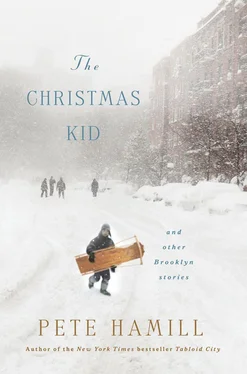“Wow,” she said, and got out, and he told her to lock the door, and then he stood alone for a moment on his side of the car. In a way, everything had changed. Rattigan’s was gone, and the old Kent cleaners, and Semke’s meat market, and Mr. B’s candy store, and Our Own bakery, and Sussman’s hardware store. There were no longer any trolley tracks, no electric wires suspended over the avenue, and the Greek’s coffee shop had gone, too, and Bernsley’s heating oil and the variety store. But the buildings were intact. The names had changed, the people had changed. A lot of them were speaking Spanish here, not Yiddish or Italian. But it was here. The neighborhood. Laverty felt his blood coursing through him, the dread gone, excitement lifting him along.
“This looks pretty rough, Dad,” his daughter said. “You think we should—”
“It’s all right. It is. Let’s look around.”
He went into the vestibule of the house where he’d lived his youth. The inside door was locked. The mailboxes were wrecked. He rang the bell of the old apartment, but nobody answered. “Just as well,” he said. “It wouldn’t be the same anyway.”
Then the door jerked open suddenly, and a middle-aged man with watery eyes stared at him. The man wore soiled clothes, and needed a shave, and the girl backed up in fear. Then the man’s face softened.
“Is that you, Jimmy?” the man said. “Jimmy Laverty?”
“Frankie D’Arcy…”
They hadn’t really been close; they’d just been boys in that neighborhood. But they embraced, and stepped into the bright sunlight, talking quickly, names and events and places coming in a stream as they went out into the street. Cubans now lived where the Lavertys had lived, but they were on vacation. “They’re good people,” Frankie said. “Hard workers…” Joe Fish had died, Eddie Gregg too. Joe Dee had four grandchildren now and lived out on the Island…
The girl backed away as the men moved along beside her, speaking a kind of code. She noticed that her father had begun to walk differently, his weight falling heavier on his right foot. He was gesturing with his hands, too, and his words were clipped now, his mouth pulled back tighter against his teeth. Laverty turned to her at one point and saw the abandoned look in her eyes.
“I’m sorry,” he said. “It’s just…”
D’Arcy hurried into a candy store. She shrugged and said, “Maybe we—”
And then D’Arcy was back. “Here you go,” he said. He handed Laverty a Spaldeen. Laverty held it in his hand as if it were something precious, and squeezed it, then rubbed it against his face, and then bounced it. Once. Again. And then he turned, and threw it against a stoop, thinking: I’m home. I’m home. I’m home.
EVERYBODY AGREED THAT THE best fruit and vegetable store in that neighborhood was run by Teddy Caravaggio. In the summer, the stands and bins outside the store were plump with the products of the earth: oranges, grapes, apples, and melons, tomatoes, lettuce, onions, and leeks. The garlic was moist and thick; the basil was always fresh. Teddy’s array of greens and reds and purples seemed lavish and extravagant on that avenue of redbrick old-law tenements.
His customers arrived from the farthest reaches of the neighborhood and some even came back after they had moved to Flatbush and Bay Ridge. When the A&P opened its giant store, Teddy continued to flourish, six days a week, from eight in the morning until eight at night. His prices were a little higher than they were in the supermarkets, but his goods had been chosen by a human hand, not hauled to market by a corporation. All the women of the neighborhood knew this and shopped at Teddy’s with a certain passion. All except Catherine Novak.
“The tomatoes at Teddy’s are beautiful this week, Catherine,” her neighbor, Mrs. Trevor, would say. “Jim would love them.”
“Thanks, Mrs. Trevor,” Catherine would say. “But the A&P’s more convenient.”
Nothing was made of this. In that neighborhood of working people, the few who took time to notice simply dismissed Catherine Novak’s little boycott as a mysterious failure of taste. They all kept going to Teddy’s. One reason for his excellent reputation was that Teddy gave his produce the kind of attention that could only be called love. Some of the women remembered coming into the empty store and hearing Teddy whispering to the tomatoes or the melons. And he gave the store his total attention. Altar boys, rising for the six o’clock Mass, could see Teddy arriving at the store in his old Plymouth to unload the boxes of produce. He’d already spent two hours at the market. Arguing, haggling, choosing. The store had his complete fidelity. He lived alone in one large room in the back, where he listened at night to opera on the Italian radio station while hand-lettering the small signs that he would place in the morning among his beloved parsley, plums, celery, and artichokes.
Nobody ever asked why Teddy Caravaggio lived alone; it was his choice, after all, like the priesthood, and his choice had certainly granted benefits to the neighborhood. In fact, nobody really knew Teddy Caravaggio outside the store. He was a thickset, blocky man, with black eyebrows and thinning hair. He never went to church, and had been too old for World War II and so was not a member of the American Legion or the VFW. Teddy existed only in the context of his wonderful store; he was what he did.
Then one morning in the fall of the year, Catherine Novak’s husband, Jim, fell over at his desk in a Wall Street brokerage house. He was dead on arrival at Beekman Downtown Hospital, and the news shocked the neighborhood. He was, after all, only forty-three, a tall, good-looking Swede. Cops, firemen, ironworkers, and longshoremen might die young, victims of the risks of their trades. Wall Street guys were supposed to die in bed. Even the low-level guys. The wake at Mike Smith’s funeral parlor was packed with mourners; the funeral filled the church; and everyone said that Catherine Novak and her three children faced the ordeal with courage and dignity. If they cried, they did not cry before an audience.
A month after the funeral, the VFW and the American Legion combined forces to throw a beer racket at Prospect Hall for the benefit of Jim Novak’s wife and children. The great hall was filled early, the beer flowed, whiskey bottles and setups crowded the tables, and the band played old songs. Catherine Novak sat with her neighbors at a table near the front of the hall. And then, a few hours after the racket had begun, Teddy Caravaggio appeared at the door. He was wearing a new blue suit and new black shoes. His face gleamed. His thinning gray hair had been freshly cut.
He entered the hall hesitantly, even shyly, and eased over to the crowded bar. The men didn’t know him very well, but the women started coming over, happy to see him. A few were surprised, because they knew that Catherine Novak didn’t patronize Teddy’s store, but they were pleased that he had come in a show of neighborhood solidarity with the grieving widow. He said his hellos, murmured his regrets, sipped a beer. And all the while, he looked through the gathering nicotine haze at Catherine Novak.
Just before midnight, he walked down the length of the hall, staying close to the walls, and came over to her.
“Hello, Catherine,” he said.
“Why, Teddy,” she said. “How nice of you to come.”
“Like to dance?”
She looked around uneasily, her hands moving awkwardly. The tables were empty as dancers moved to a tune called “It’s All In the Game.” She smiled, tentatively, and said: “Well, sure.”
They went out to the crowded floor and began to dance. Teddy moved gracefully, but maintained a discreet distance.
Читать дальше












